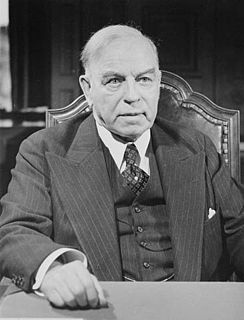A Quote by Bernard Baruch
Increased wages, higher pensions, more unemployment insurance, all are of no avail if the purchasing power of money falls faster.
Related Quotes
An underpaid man is a customer reduced in purchasing power. He cannot buy. Business depression is caused by weakened purchasing power. Purchasing power is weakened by uncertainty or insufficiency of income. The cure of business depression is through purchasing power, and the source of purchasing power is wages.
The greatest danger to an adequate old-age security plan is rising prices. A rise of 2% a year in prices would cut the purchasing power of pensions about 45% in 30 years. The greatest danger of rising prices is from wages rising faster than output per man-hour.... Whether the nation succeeds in providing adequate security for retired workers depends in large measure upon the wage policies of trade unions.
Education is the key to the future: You've heard it a million times, and it's not wrong. Educated people have higher wages and lower unemployment rates, and better-educated countries grow faster and innovate more than other countries. But going to college is not enough. You also have to study the right subjects.
Free migration within Europe means that countries that have done a better job at reducing unemployment will predictably end up with more than their fair share of refugees. Workers in these countries bear the cost in depressed wages and higher unemployment, while employers benefit from cheaper labor.
The study titled 'Impact of Immigration on Wages, by Education Level, 1994-2007' found that increased immigration had an effect of lowering wages for earlier immigrants by an average of 4.6 percent. Running counter to popular perception is the finding that for native-born Americans, wages actually increased by 0.6 percent.
Requiring the payment of higher wages will lead to a loss of some jobs and a raising of prices which drives companies to search for automation to reduce costs. On the other hand, those receiving higher wages will spend more (the marginal propensity to consume is close to 1 for low income earners) and this will increase demand for additional goods and services. Henry Ford had the clearest vision of why companies can actually benefit by paying higher wages.
Big cities like New York are thriving, economically, culturally, in terms of real estate values, and by a slew of other measures. Yet, at the same time, much of the country has been utterly hollowed out. In California, where I live, affluent coastal cities such as San Francisco and the Silicon Valley hubs have lower than national average unemployment, higher wages, higher tax bases. Meanwhile, there are inland counties in California where there's still nearly 20 percent unemployment.
Private property works like circuitry in electronics, or piping in hydraulics. It conveys wages to the owners of labor power, as well as the various forms of nonwage property income to the owners of capital. In itself, it is no more responsible for maldistribution of purchasing power than the science of bookkeeping is responsible for bankruptcy.
In working on any one problem, such as higher minimum wages, so many other issues come into play, such as some businesses possibly closing down, thus creating fewer jobs and more unemployment and incentivizing companies to import more goods from abroad, which leads to even less employment at home, and so on.

































